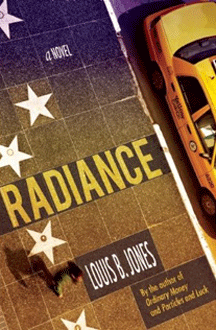 “This was a city of the world, a profound city, an endless city,” reflects Mark Perdue, the narrator and protagonist of Louis B. Jones’ latest novel, Radiance (Counterpoint; 240 pages), as he contemplates the unfamiliar surroundings of Los Angeles.
“This was a city of the world, a profound city, an endless city,” reflects Mark Perdue, the narrator and protagonist of Louis B. Jones’ latest novel, Radiance (Counterpoint; 240 pages), as he contemplates the unfamiliar surroundings of Los Angeles.
The departure from Jones’ home turf of Terra Linda and Berkeley — ground zero for his previous novel, Particles and Luck, also featuring Perdue, and his alarmingly excellent first novel, Ordinary Money — is salutary, and disturbing, for the author and his invented worlds.
In the new book, Perdue, a physics prof at UC Berkeley with a fading career that may be related to symptoms from Lyme’s Disease, is confronting what in less elegant terms than Jones’ might be considered a mid-life crisis.
His wife, Audrey, is suffering post-partum depression after a late-term abortion of “Noddy,” an embryo they learned would have been doomed to a half life of suffering and incomprehension; he has been disinvited to a prestigious physics conference because of his dimming star, and his daughter, Carlotta, is in deep pain from the usual set of teenage agonies, as well as her unresolved feelings about the decision to abort the baby-in-waiting.
Like a latter-day Candide, Perdue sets off to fix the problem by taking Lotta to a Celebrity Fantasy Vacation in L.A., where she can indulge in the make-believe of being a rock star, and her father can pursue his dreams of rescue — and, not incidentally, entertain a not-so-chaste flirtation with Blythe Cress, the escort assigned to the occasion who seems as cool and available as her name.
It’s unlikely grist for a comic novel, albeit one with serious implications. Jones, this poet of suburbia, is devoted to the complex subject of monogamy, to discerning meaning in the customary void, and to coming to terms with the responsibilities of fatherhood. But Radiance delivers.
Lotta finds herself in an unlikely romance with a paraplegic drummer, Bodie, with aspirations to saving the world. Through a series of plot machinations, the two find themselves trapped under the Hollywood sign, the place where the dream-makers always seem to find themselves.
When Mark comes to rescue them, he and the star-crossed lovers find themselves on a double-date with the LAPD, ending up in a Santa Monica police station where they engage in a Seinfeldian series of political debates that end up re-invigorating Perdue’s scientific curiosity.
Closer to the ground, he has to decide what to do with Blythe, and his own erotic confusion.
“A necessary base of male desire is that it’s fundamentally impolite,” Jones writes. “What it wants to do to a female is to literally get on top and reduce her to mindlessness, maybe that’s not the deliberate intention, but it’s what happens in the end, and you have to want to undertake to do this to somebody with her own dignity and sensibility and rights.”
Characteristically, Perdue gets out of this dilemma by sabotaging his own amatory interests. He appreciates the sacrifice this “escort” is willing to make for him, as she comes back to his hotel room after bailing the threesome out of jail. “And now here she was on the bed; she had made herself now a lower-class sort of woman for him, a second-best, low-self-esteem, out-of–town woman.” Possibly out of respect for her, and out of understanding what the implications would be with Audrey, he simply (and comically) blows it.
Jones (whom duty compels me to report I know a bit, having excerpted a section of his earlier novel, California’s Over, in the San Francisco Examiner Magazine) is a fine observer of the failings of the species, and is particularly acute about the lapses of his own gender. He manages to write about sex without the lubricity or self-regard of an Updike, and strikes a different note, in a minor and more delicate key than, say, Tom Perrota or Franzen.
And he’s a master of the throw-away line. “All that was worrying her was the fate of The Earth, that trifle,” Perdue thinks, in the midst of a hot political/environmental debate with his daughter.
In an interview with the website writeononline.com, Jones says, of his own becomingly modest literary aspirations, “I shy away from specific themes or morals. As for what readers might carry away from any of my books, I guess I most hope that they might go off loving the world more, and their own lives more. Empathy is the special gift of the narrative arts.”
Louis B. Jones’ empathetic vision sees beyond the stars, into our hearts, with rigorous unsentimentality and an almost cosmic sense of forgiveness.
Louis B. Jones will be reading from and signing copies of Radiance at Book Passage, 51 Tamal Vista Blvd., Corte Madera, at 7 p.m. today.
Paul Wilner is a member of the National Book Critics Circle who has contributed to the Paris Review, the San Francisco Chronicle and Los Angeles Times Book Review sections and Barnesandnoblereview.com, among other publications. He is currently Journalism Coordinator for the Academy of Art’s Fashion Department.

This book is one of Jones’ best–and that’s saying something. I gave it a short review online several weeks ago. How marvelous to have a literate writer who can both plot and explore nuanced emotion!